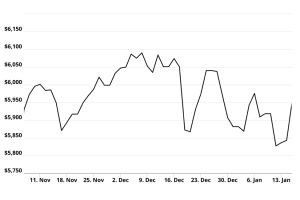
Timing the market can be strenuous, especially if you don’t have time to follow daily market news and gyrations. Instead, a better approach is identifying sustainable secular themes and picking suitable long-term stocks.
Over the next decade, several trends will define our investment landscape. The markets widely appreciate some, like artificial intelligence and cloud computing. Indeed, investors have crowded into stocks like Nvidia (NASDAQ:NVDA) and Microsoft (NASDAQ:MSFT) to benefit from these secular themes.
However, some themes that could be secular winners are not in investors’ minds. These include air travel growth, increased technology usage in law enforcement and increased semiconductor use in vehicles. In the long term, these secular themes will spur growth in properly positioned stocks.
ASML Holding N.V. (ASML)

This Netherlands-based semiconductor equipment company is one of the best stocks to hold for 10 years. It manufactures lithography systems that are used in the production of semiconductors. ASML Holding N.V. (NASDAQ:ASML) will be a critical player in the semiconductor decade.
The company will profit from several secular themes such as artificial intelligence and reshoring. Regarding artificial intelligence, the launch of ChatGPT has spurred a shift in budgets. Major cloud service providers are shifting high-performance computing spending to artificial intelligence. As AI chip demand soars, demand for the highly complex chip production machines ASML provides will soar.
Also, reshoring chipmaking is another theme spurring further demand for ASML. Countries like the U.S. and Japan are urging semiconductor foundries to build capacity locally. As a result, more factories are being constructed. Also, new applications such as autonomous systems in electric vehicles mean more semiconductor demand, creating the need for more equipment.
ASML has a monopoly in extreme ultraviolet (EUV) equipment. Each EUV machine requires over 100,000 components from specialty providers. Only ASML has the intellectual property and capability to manufacture a machine of such complexity. Given the sophistication of these machines, the company sells them for over $200 million each. With no competition in EUV machines, ASML will be critical in chip manufacturing and is one of the best long-term stocks.
Axon Enterprise (AXON)

Axon Enterprise (NASDAQ:AXON) has built a long-term business based on its mission to protect life in the service of promoting peace, justice and strong institutions. As a leader in global public safety, it has developed a suite of hardware and software solutions to improve public safety.
Initially, the company started as a manufacturer of TASER systems. TASER, its conducted energy devices, supports law enforcement in de-escalating situations, hence minimizing the use of force. Then, gradually, it introduced other products, such as police body cams, fleet cameras and cloud-hosted digital evidence management.
Currently, Axon’s system encapsulates the whole enforcement process from dispatch to the courtroom. Due to the effectiveness of these products, the company has over 17,000 public safety agencies as customers.
Yet, the company still has a massive opportunity, making it one of the top long-term stocks. For instance, while TASER adoption in the U.S. is about 35%, it is under 5% in Europe, Latin America and Asia. Body and fleet in-car camera adoption is still below 10% globally. What’s more, state and local governments are increasing their public safety budgets.
Due to increased public safety spending, Axon revenues have surged. Its recurring revenues from its cloud-based solution have grown at a 44% compounded annual growth rate from Q3 fiscal year 2019. Overall revenues grew 27% and 38% in 2021 and 2022, respectively.
General Electric (GE)

The secular growth in air travel makes General Electric (NYSE:GE) one of the stocks to buy and hold. According to the International Air Transport Association, air travel demand will grow 3.4% annually and double by 2040. Rising demand from the emerging middle class in Asia will fuel this growth.
Now that General Electric is moving closer to a pure-play aviation company, it will be a secular winner. It’s no longer the underperforming conglomerate of the past. Under Larry Culp’s leadership, the company has shed non-core assets like its healthcare and aircraft leasing businesses.
Given its concentrated nature and competitive barriers, aviation is a crown jewel that makes GE stock one of the best long-term stocks. General Electric is one of the primary jet engine suppliers alongside Rolls-Royce and RTX’s (NYSE:RTX) Pratt & Whitney. The company commands over half of the commercial engine market. Besides, it has a 50% interest in CFM, its joint venture with Safran (OTCMKTS:SAFRY).
Over the last several years, General Electric’s profitability has been hampered by the losses at GE Vernova, its power, renewable energy and digital and energy financial services business. Notably, the losses in the renewable segment have obscured aviation’s strength. However, General Electric is preparing to spin off GE Vernova in 2024. As a standalone entity, GE Aerospace’s profitability and margins will shine through.
Commercial aerospace is flying high, as the third-quarter results showed. Revenues in the segment increased 29% year-over-year. As long as travel remains resilient, demand for General Electric’s commercial engines will remain elevated.
On the date of publication, Charles Munyi did not hold (either directly or indirectly) any positions in the securities mentioned in this article. The opinions expressed in this article are those of the writer, subject to the InvestorPlace.com Publishing Guidelines.




